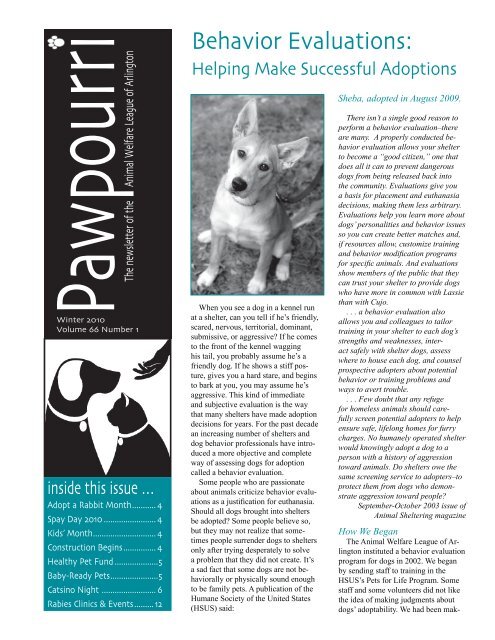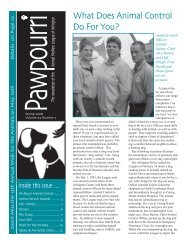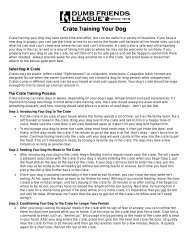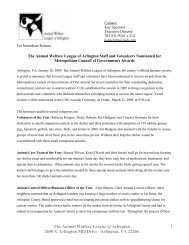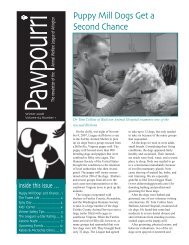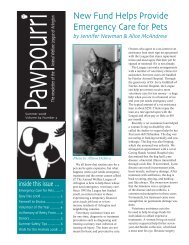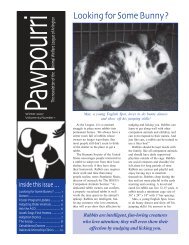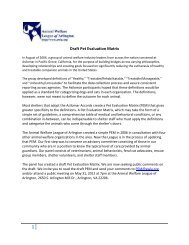Behavior Evaluations: - Animal Welfare League of Arlington
Behavior Evaluations: - Animal Welfare League of Arlington
Behavior Evaluations: - Animal Welfare League of Arlington
Create successful ePaper yourself
Turn your PDF publications into a flip-book with our unique Google optimized e-Paper software.
Pawpourri<br />
The newsletter <strong>of</strong> the <strong>Animal</strong> <strong>Welfare</strong> <strong>League</strong> <strong>of</strong> <strong>Arlington</strong><br />
Winter 2010<br />
Volume 66 Number 1<br />
inside this issue …<br />
Adopt a Rabbit Month........... 4<br />
Spay Day 2010......................... 4<br />
Kids’ Month............................. 4<br />
Construction Begins................ 4<br />
Healthy Pet Fund.....................5<br />
Baby-Ready Pets......................5<br />
Catsino Night ......................... 6<br />
Rabies Clinics & Events.......... 12<br />
<strong>Behavior</strong> <strong>Evaluations</strong>:<br />
Helping Make Successful Adoptions<br />
When you see a dog in a kennel run<br />
at a shelter, can you tell if he’s friendly,<br />
scared, nervous, territorial, dominant,<br />
submissive, or aggressive? If he comes<br />
to the front <strong>of</strong> the kennel wagging<br />
his tail, you probably assume he’s a<br />
friendly dog. If he shows a stiff posture,<br />
gives you a hard stare, and begins<br />
to bark at you, you may assume he’s<br />
aggressive. This kind <strong>of</strong> immediate<br />
and subjective evaluation is the way<br />
that many shelters have made adoption<br />
decisions for years. For the past decade<br />
an increasing number <strong>of</strong> shelters and<br />
dog behavior pr<strong>of</strong>essionals have introduced<br />
a more objective and complete<br />
way <strong>of</strong> assessing dogs for adoption<br />
called a behavior evaluation.<br />
Some people who are passionate<br />
about animals criticize behavior evaluations<br />
as a justification for euthanasia.<br />
Should all dogs brought into shelters<br />
be adopted? Some people believe so,<br />
but they may not realize that sometimes<br />
people surrender dogs to shelters<br />
only after trying desperately to solve<br />
a problem that they did not create. It’s<br />
a sad fact that some dogs are not behaviorally<br />
or physically sound enough<br />
to be family pets. A publication <strong>of</strong> the<br />
Humane Society <strong>of</strong> the United States<br />
(HSUS) said:<br />
Sheba, adopted in August 2009.<br />
There isn’t a single good reason to<br />
perform a behavior evaluation–there<br />
are many. A properly conducted behavior<br />
evaluation allows your shelter<br />
to become a “good citizen,” one that<br />
does all it can to prevent dangerous<br />
dogs from being released back into<br />
the community. <strong>Evaluations</strong> give you<br />
a basis for placement and euthanasia<br />
decisions, making them less arbitrary.<br />
<strong>Evaluations</strong> help you learn more about<br />
dogs’ personalities and behavior issues<br />
so you can create better matches and,<br />
if resources allow, customize training<br />
and behavior modification programs<br />
for specific animals. And evaluations<br />
show members <strong>of</strong> the public that they<br />
can trust your shelter to provide dogs<br />
who have more in common with Lassie<br />
than with Cujo.<br />
. . . a behavior evaluation also<br />
allows you and colleagues to tailor<br />
training in your shelter to each dog’s<br />
strengths and weaknesses, interact<br />
safely with shelter dogs, assess<br />
where to house each dog, and counsel<br />
prospective adopters about potential<br />
behavior or training problems and<br />
ways to avert trouble.<br />
. . . Few doubt that any refuge<br />
for homeless animals should carefully<br />
screen potential adopters to help<br />
ensure safe, lifelong homes for furry<br />
charges. No humanely operated shelter<br />
would knowingly adopt a dog to a<br />
person with a history <strong>of</strong> aggression<br />
toward animals. Do shelters owe the<br />
same screening service to adopters–to<br />
protect them from dogs who demonstrate<br />
aggression toward people?<br />
September-October 2003 issue <strong>of</strong><br />
<strong>Animal</strong> Sheltering magazine<br />
How We Began<br />
The <strong>Animal</strong> <strong>Welfare</strong> <strong>League</strong> <strong>of</strong> <strong>Arlington</strong><br />
instituted a behavior evaluation<br />
program for dogs in 2002. We began<br />
by sending staff to training in the<br />
HSUS’s Pets for Life Program. Some<br />
staff and some volunteers did not like<br />
the idea <strong>of</strong> making judgments about<br />
dogs’ adoptability. We had been mak-
<strong>Behavior</strong> <strong>Evaluations</strong> Continued<br />
ing those judgments all along, however,<br />
but without a formal structure.<br />
Over the years our behavior evaluation<br />
has been constantly refined. Our staff<br />
have been trained through the American<br />
Humane Association, ASPCA, and<br />
BADRAP, among others.<br />
Adoptability<br />
Are all dogs with behavior issues euthanized?<br />
Of course not! <strong>Evaluations</strong> are<br />
not only focused on aggression, they<br />
can tell us important information about<br />
issues that can be worked on to make<br />
dogs more appealing to adopters. Our<br />
no-pull program teaches dogs looseleash<br />
walking so they don’t drag their<br />
new owners down the sidewalk. Our<br />
hand-feeding program teaches dogs<br />
to trust that having humans nearby<br />
is not a threat to their food. A young<br />
60-pound, athletic dog may be appropriate<br />
for adults, but not for a home<br />
with toddlers. A timid dog that cringes<br />
in the back <strong>of</strong> the kennel may bloom in<br />
a quiet home with a gentle person.<br />
The behavior evaluation is only<br />
one piece <strong>of</strong> the pie in determining a<br />
dog’s adoptability. If surrendered by<br />
the owner, the dog’s past history with<br />
people and animals is an important<br />
factor. We also consider the dog’s behavior<br />
in the shelter kennels with staff<br />
and with other dogs. Is she a terror in<br />
the kennel, but a sweetheart as soon as<br />
she comes out?<br />
What We Can Learn<br />
Our behavior evaluation program<br />
provides answers to common questions<br />
from potential adopters:<br />
Will this dog be good with my<br />
2 Pawpourri Winter 2010<br />
Kokomo,<br />
adopted in<br />
September<br />
2009.<br />
children? Can<br />
I take that dog<br />
to the dog park?<br />
Will this dog be<br />
ok living in my<br />
condo? Is that<br />
dog housetrained?<br />
Can you tell me<br />
more about this<br />
dog?<br />
Our adoptions<br />
staff is responsible<br />
for the behavior evaluations, and<br />
there are always at least two people in<br />
an evaluation for safety. One person<br />
handles the dog while the other<br />
captures all <strong>of</strong> the observations and<br />
lends a second set <strong>of</strong> eyes to catch any<br />
behavior that may not be visible to the<br />
handler.<br />
Dogs communicate for the most<br />
part through body language. They use<br />
all <strong>of</strong> their body parts to tell you how<br />
they feel. Not only observing their<br />
body language but how they physically<br />
interact with the handler is important.<br />
Everything from how they jump up on<br />
you to how they look at you provides<br />
insight. A more confident, pushy dog<br />
may make more invasive contact with<br />
the handler, jumping up hard and in a<br />
frontal orientation. A more submissive<br />
personality may still jump up but it is<br />
more gentle and <strong>of</strong>ten oriented sideways<br />
to their handler. A dog with a<br />
s<strong>of</strong>t expression will have his ears back,<br />
eyes look like they are squinting, and<br />
the brow is relaxed. A dog with a hard<br />
expression will have big, round dilated<br />
open eyes (they look like marbles),<br />
ears are up and forward, and they may<br />
directly face or stare at the handler.<br />
Did you know that your dog may<br />
be stressed if her body is crouched<br />
and she licks her lips, or she may<br />
shake, whine or yawn as well? A dog<br />
may shake <strong>of</strong>f as a way to “reset”<br />
themselves from something that was<br />
stressful. A dog may show displacement<br />
behaviors such as raising a paw,<br />
lowering the head, looking away, moving<br />
slowly, and sniffing the ground as<br />
a way to communicate that he means<br />
no harm. Our job is to observe and<br />
record all <strong>of</strong> the dog’s responses which<br />
may include but not be limited to those<br />
discussed above.<br />
Parts <strong>of</strong> the Evaluation<br />
Background<br />
Before handling starts, we do an<br />
overall review <strong>of</strong> the dog–what is the<br />
breed and its characteristics, age and<br />
sex, was the dog an owner surrender or<br />
was he a stray. If an owner surrender,<br />
then what information did the previous<br />
owner provide us, and how has<br />
the dog been adjusting to the shelter<br />
environment? The evaluation begins<br />
from the moment we take the dog out<br />
<strong>of</strong> his kennel. We observe how he is<br />
responding to the stress <strong>of</strong> the shelter<br />
environment. We then take the dog for<br />
a brief walk–a housetrained dog will<br />
typically keep her kennel clean and<br />
relieve herself immediately upon going<br />
outside. At this point we will also note<br />
how a dog walks on leash, as well as<br />
whether he may be fearful <strong>of</strong> traffic. A<br />
strong dog that pulls hard on a leash<br />
will be a better match for a physically<br />
fit, active owner. A dog that shows<br />
sensitivity to traffic while on leash may<br />
not be best suited to living in a bustling<br />
city.<br />
Sociability with People<br />
The next part <strong>of</strong> the evaluation takes<br />
place in the shelter’s quiet general<br />
purpose room. We first look at the<br />
dog’s level <strong>of</strong> sociability–how the dog<br />
chooses to interact with the handler<br />
as well as whether that interaction<br />
changes when the handler solicits attention<br />
through an encouraging voice<br />
or gentle petting. A social dog will<br />
generally welcome and be comfortable<br />
with this type <strong>of</strong> interaction. A sociable<br />
dog is also less likely to bite. If<br />
a dog likes or seeks s<strong>of</strong>t social contact<br />
from people, when the time comes for<br />
people to do something the dog doesn’t<br />
like, the dog is less likely to react aggressively.<br />
Keeping that in mind, we<br />
next handle the dog’s ears and feet and<br />
look at the teeth. Not only do we make<br />
observations based on health–will the<br />
dog need a dental cleaning or does she<br />
have an ear infection–but we also will
etter understand how she responds to<br />
invasive handling and restraint. How<br />
will this dog respond at the groomer or<br />
vet’s <strong>of</strong>fice? If this dog shows sensitivity<br />
to being touched or restrained, then<br />
he is not best suited for young children,<br />
whereas a dog that is not sensitive and<br />
enjoys handling will be a better fit for a<br />
home with children.<br />
Resource Guarding<br />
We then look at resource guarding–<br />
most people have seen this on shows<br />
on <strong>Animal</strong> Planet where the “fake”<br />
or Assess-A-Hand comes into play.<br />
Dogs may guard items that they value.<br />
Valuable items can be food, rawhide,<br />
toys and in a home can also include a<br />
spot on the couch, a dirty sock, or their<br />
owner. Resource guarding includes<br />
a wide spectrum <strong>of</strong> behaviors from<br />
eating their food at a quicker pace,<br />
becoming visibly tense, or they may<br />
punch at their food when the hand approaches<br />
to the more extreme behavior<br />
<strong>of</strong> freezing, growling, and biting. If<br />
you were to drop a plate <strong>of</strong> food on<br />
the ground, would this dog guard the<br />
food mixed in with the shattered glass<br />
(a dangerous scenario for both you and<br />
your dog)? How many times do dogs<br />
find food items on their walks outside<br />
with their owners? A scavenged<br />
chicken bone could cause serious<br />
harm to your dog’s internal organs ;<br />
your dog’s life is at risk if you can’t<br />
take that bone away. Some dogs that<br />
guard their food may go on to guard a<br />
rawhide or other treat. Depending on<br />
the level <strong>of</strong> guarding and the size <strong>of</strong> the<br />
dog, we may recommend that the dog<br />
not go to a home with children and that<br />
they go to a home with an experienced<br />
dog owner that can manage this dog<br />
safely and train the dog to minimize<br />
the behavior.<br />
Play Style<br />
Once tested with food and food-type<br />
toys, we take out the lower value items<br />
such as tennis balls, rope, and squeaky<br />
toys. Does the dog fetch? What are<br />
his favorite toys? Does the dog know<br />
how to play or is he afraid <strong>of</strong> the toys?<br />
Does the dog easily engage in play<br />
with the handler or does she keep to<br />
herself and prefer to explore the smells<br />
in the room? Or does the dog prefer<br />
to stay near the handler rather than<br />
play with toys? The dog may be very<br />
polite in play by dropping the ball at<br />
your feet or could be very physical<br />
by jumping up and snatching toys out<br />
<strong>of</strong> your hand. If you run around with<br />
the dog and he starts body slamming<br />
and nipping at your arms and legs,<br />
we would recommend that the owner<br />
keep play controlled through integrating<br />
obedience commands into play<br />
sessions. A gentle dog will be better<br />
for a home with children whereas a<br />
rough-playing dog will be best suited<br />
for older children and active adults<br />
who can channel all that energy into<br />
appropriate activities.<br />
Confinement<br />
The last few steps <strong>of</strong> the behavior<br />
evaluation include crating the dog. A<br />
dog that is anxious in a crate may need<br />
a baby-gated area when first brought<br />
into a new home. A dog that is vocal<br />
when crated or left alone may not be<br />
appropriate for someone who lives in<br />
an apartment or condo. We also go<br />
through some basic obedience commands<br />
to gauge what commands they<br />
know, if any. Some adopters want a<br />
dog that has some training while others<br />
are willing to work with a dog that<br />
does not know any commands.<br />
Sociability with Dogs<br />
Being in such a heavily dog<br />
populated area, it is also important<br />
to assess how the dog will get along<br />
with fellow canines. We have the dog<br />
meet another shelter dog to assess their<br />
level <strong>of</strong> interest. A dog that is highly<br />
social with other dogs may be a good<br />
candidate for dog park visits, which is<br />
a favorite pastime for many people in<br />
our community. Dogs that are not well<br />
socialized may be overwhelmed at a<br />
dog park or dogs that play too roughly<br />
may easily get into fights.<br />
The Big Picture<br />
Rarely is a dog perfect in every way<br />
and appropriate for any type <strong>of</strong> home<br />
or adopter. The behavior evaluation<br />
gives us information to help adopters<br />
make their decision and to help guide<br />
them to the dog that is the right fit for<br />
their family. Adopters want to know<br />
what commitment they are making and<br />
what issues they will need to work on<br />
when they bring a dog into their home.<br />
A successful adoption is the best<br />
outcome for the dog and for the people<br />
who will enjoy his companionship.<br />
<strong>League</strong> Services<br />
Emergencies in <strong>Arlington</strong><br />
We respond to animal emergencies 24<br />
hours a day.<br />
Adoptions<br />
We always have animals who need<br />
good homes. If you live in Virginia, DC,<br />
or Maryland call us about adopting a<br />
companion.<br />
<strong>Animal</strong> Control & Cruelty Investigation<br />
<strong>Animal</strong> control <strong>of</strong>ficers pick up stray<br />
dogs and respond to citizen complaints<br />
about animals in <strong>Arlington</strong>.<br />
Community Services<br />
The <strong>League</strong> sponsors community services<br />
that help people and animals. Visit<br />
our Web site at www.awla.org or call<br />
(703) 931-9241 x 200 for information.<br />
Lost & Found<br />
Call (703) 931-9241 x 200 or visit our<br />
Web site at www.awla.org to report all<br />
lost and found animals. We can help<br />
find animals’ owners and return lost pets<br />
home again.<br />
Wildlife Rescue & Problems<br />
We’ll help get injured or abandoned wildlife<br />
to a licensed rehabilitator whenever<br />
possible. We’ll also help you discourage<br />
wildlife from moving into your home.<br />
Rabies Control<br />
See the calendar on the back cover for<br />
clinic dates and times.<br />
Speakers & Humane Education<br />
If your neighborhood is having animal<br />
problems or problems with irresponsible<br />
animal owners, you might want a <strong>League</strong><br />
representative to address your civic association.<br />
We also present educational<br />
programs on many topics to schools and<br />
clubs. Visit our website at www.awla.<br />
org or call (703) 931-9241 x 213 for<br />
information.<br />
Pawpourri, the newsletter <strong>of</strong> the <strong>Animal</strong><br />
<strong>Welfare</strong> <strong>League</strong> <strong>of</strong> <strong>Arlington</strong>, 2650 S.<br />
<strong>Arlington</strong> Mill Dr., <strong>Arlington</strong>, VA 22206,<br />
http://www.awla.org, is published quarterly<br />
and mailed to <strong>League</strong> supporters. If<br />
you receive multiple copies, please<br />
notify us and pass them along to<br />
friends.<br />
A COPY OF THE LATEST FINANCIAL<br />
REPORT AND REGISTRATION FILED BY<br />
THE ANIMAL WELFARE LEAGUE OF<br />
ARLINGTON MAY BE OBTAINED<br />
BY CONTACTING the State Division <strong>of</strong><br />
Consumer Affairs, Department <strong>of</strong> Agriculture<br />
and Consumer Services, P.O.<br />
Box 1163, Richmond, VA 23209. REG-<br />
ISTRATION DOES NOT IMPLY EN-<br />
DORSEMENT, APPROVAL, OR REC-<br />
OMMENDATION BY THE STATE.<br />
Winter 2010 Pawpourri 3
February is Adopt a<br />
Rescued Rabbit Month<br />
The <strong>League</strong> joins the House Rabbit Society<br />
(HRS) in recognizing February as Adopt a Rescued<br />
Rabbit Month.<br />
“For the right people, rabbits are wonderful<br />
indoor companions” says HRS President Kathleen<br />
Wilsbach. “They get along with many other companion<br />
animals (including gentle cats and dogs),<br />
are intelligent, affectionate and inquisitive, and can<br />
readily learn to use a litter box.”<br />
The <strong>League</strong> always has a variety <strong>of</strong> rabbits in<br />
need <strong>of</strong> homes. We can provide all the information<br />
you need to know about how to care for these interesting creatures. And remember<br />
that rabbits are social animals, so consider adopting a pair!<br />
Spay Day 2010<br />
Once again this year the <strong>Animal</strong><br />
<strong>Welfare</strong> <strong>League</strong> <strong>of</strong> <strong>Arlington</strong> will<br />
participate in Spay Day USA, the<br />
only national day <strong>of</strong> action to promote<br />
spaying and neutering <strong>of</strong> pets. Last<br />
year our partnership with the Washington<br />
Metropolitan Spay/Neuter<br />
Center and Fairfax <strong>Animal</strong> Hospital<br />
resulted in the spaying and neutering<br />
<strong>of</strong> 74 dogs and cats for just $25 each.<br />
Your generous donations to the Hantke<br />
Memorial Spay/Neuter Fund subsidized<br />
the cost to <strong>of</strong>fer low income pet<br />
owners the opportunity to get their<br />
pets neutered at this bargain price. For<br />
many people this provides their only<br />
opportunity to get their pets spayed or<br />
neutered. In addition, they can also get<br />
discounted rabies and distemper vaccinations<br />
and microchips.<br />
Why: Perhaps no one knows better<br />
than those who work at shelters the<br />
tragedy <strong>of</strong> unwanted pets and the<br />
importance <strong>of</strong> promoting spaying and<br />
neutering. Spay/neuter is the only permanent,<br />
100 percent effective method<br />
<strong>of</strong> birth control for dogs and cats and a<br />
proven way to reduce the vast numbers<br />
<strong>of</strong> homeless animals. In addition to<br />
Rendering <strong>of</strong> the<br />
kennel addition<br />
(does not show<br />
existing shelter)<br />
4 Pawpourri Winter 2010<br />
reducing the number <strong>of</strong> homeless pets<br />
on our streets and in our shelters, spaying<br />
and neutering provides significant<br />
benefits for pets and their owners:<br />
• Neutered pets are less likely to run<br />
away.<br />
• Male cats will be less likely to<br />
spray, and male dogs will be less<br />
inclined to bite and get in fights with<br />
other dogs. Spaying eliminates heat<br />
cycles in female dogs and cats.<br />
• Spaying and neutering has been<br />
shown to reduce the occurrence <strong>of</strong><br />
certain forms <strong>of</strong> cancer.<br />
• In addition, neutered pets tend<br />
to have better temperaments and<br />
are less likely to develop behavior<br />
problems–all <strong>of</strong> which makes for a<br />
better companion for you!<br />
How You Can Help: Please help<br />
promote this event to those needing<br />
financial assistance and please consider<br />
donating to the Hantke Memorial<br />
Spay/Neuter Fund. Use the postage<br />
paid envelope in this newsletter to<br />
make a donation and designate this<br />
fund. Please check our Web site www.<br />
awla.org for up-to-date Spay Day 2010<br />
plans starting in February!<br />
Kids’ Month<br />
Registration Begins<br />
February 1, 2010<br />
Every July the <strong>League</strong> <strong>of</strong>fers four<br />
summer camp sessions for children<br />
ages 6-13. Please mark your calendars<br />
now: camp registration begins February<br />
1 and camps fill up quickly!<br />
Registration and waitlists are usually<br />
full by the end <strong>of</strong> February so be sure<br />
to stop by the <strong>League</strong> on February 1,<br />
2010, or visit our Web site:<br />
www.awla.org and click on Community<br />
Services and Education to learn<br />
more or to print a registration form<br />
(available February 1, 2010).<br />
Construction on<br />
Our Dog Kennel<br />
Addition Has<br />
Begun<br />
On December 1, 2009, we began a<br />
long-anticipated construction project to<br />
add to our dog housing space. We will<br />
be adding 10 double runs for dogs, a<br />
space for behavior evaluations, medical<br />
examination room, as well as laundry<br />
facilities and storage space. The addition<br />
will serve as dog intake and<br />
quarantine area so that all dogs in our<br />
main kennel will be those<br />
currently available for adoption.<br />
The first step was demolition <strong>of</strong><br />
three storage sheds at the back <strong>of</strong> the<br />
shelter property. We expect building to<br />
take six to nine months. During<br />
this time we ask our supporters and<br />
visitors to “pardon our dust.” You can<br />
follow the progress <strong>of</strong> construction on<br />
our Web site at<br />
www.awla.org/construction.shtml.
Healthy Pet Fund Success: Tequila<br />
Although Tequila was tiny, she<br />
wasn’t tiny enough to escape the landlord’s<br />
notice. Her family brought her<br />
to the shelter because they had moved<br />
to an apartment that didn’t allow<br />
pets. Chihuahuas are popular dogs in<br />
urban areas, but we found a significant<br />
problem in Tequila’s health exam. She<br />
tested positive for heartworm disease.<br />
Heartworm disease is a serious and<br />
potentially fatal condition caused by<br />
parasitic worms living in the arteries<br />
<strong>of</strong> the lungs and occasionally in the<br />
right side <strong>of</strong> the heart <strong>of</strong> dogs, cats,<br />
and other species <strong>of</strong> mammals. Dogs<br />
Baby-Ready Pets<br />
Every year, thousands <strong>of</strong> animals are<br />
turned into shelters by parents concerned<br />
about how their pet may affect<br />
the health and safety <strong>of</strong> their new baby.<br />
Any pet can have undesirable, although<br />
natural reactions to a new baby. New<br />
sounds, smells, and activities surrounding<br />
an infant may cause a pet to see<br />
the baby as competition, prey, or even<br />
a toy. Since March 2009, the <strong>League</strong><br />
has <strong>of</strong>fered a class to help parents with<br />
pets prepare for a new baby. The class<br />
Tequila, adopted in<br />
June 2009.<br />
and cats <strong>of</strong> any age or<br />
breed are susceptible to<br />
infection. Heartworm is<br />
spread by mosquitos that<br />
bite an infected animal<br />
and then bite another<br />
animal, and the infective<br />
larvae enter through the<br />
bite wound. Options for preventing<br />
heartworm infection in both dogs and<br />
cats include daily and monthly tablets<br />
and chewables, monthly topical, and a<br />
six-month injectable product available<br />
only for dogs. Prevention is safe, easy,<br />
and inexpensive. (Visit www.heartwormsociety.org<br />
for more information.)<br />
Treatment for heartworm disease<br />
can be expensive and is not always<br />
successful depending on the severity<br />
<strong>of</strong> the disease. Because <strong>of</strong> the<br />
<strong>League</strong>’s Woody and Mickey Healthy<br />
Pet Fund, we can treat shelter animals<br />
for medical needs that go beyond<br />
routine treatment. Tequila was a good<br />
candidate for treatment because her<br />
disease was not very advanced and she<br />
was only five years old. We sent her<br />
to a local veterinarian for treatment<br />
and then to a foster home for recovery.<br />
After treatment exercise should be limited<br />
to leash walking for two months.<br />
Because prevention is so easy and<br />
treatment both expensive and hard on<br />
the animal, all dogs in our area should<br />
be on a heartworm preventative medication<br />
year round. Ask your veterinarian<br />
about this lifesaving medicine.<br />
After spending two months in her<br />
foster home, Tequila returned to the<br />
shelter and was adopted quickly. Her<br />
new family reports that she is healthy<br />
and happy. Because <strong>of</strong> $1,150 provided<br />
by the Woody and Mickey Healthy<br />
Pet Fund, Tequila can enjoy a long life.<br />
Please help other shelter pets overcome<br />
treatable medical problems by<br />
donating generously to this fund (see<br />
the attached postage paid envelope).<br />
will be <strong>of</strong>fered once a month<br />
in 2010.<br />
Baby-Ready Pets is based<br />
on a program created by the<br />
Providence <strong>Animal</strong> Rescue<br />
<strong>League</strong> and the Rhode Island<br />
SPCA, and has been endorsed<br />
by the ASPCA. The <strong>Animal</strong><br />
<strong>Welfare</strong> <strong>League</strong> <strong>of</strong> <strong>Arlington</strong>’s<br />
staff present Baby-Ready<br />
Pets to expectant parents in<br />
two-hour workshops at the<br />
<strong>League</strong>. After the program,<br />
participants may call or e-mail<br />
follow-up questions if they<br />
need additional support. Participants<br />
will also receive helpful handouts and<br />
a CD <strong>of</strong> baby sounds to help desensitize<br />
their pets to the sounds <strong>of</strong> the new<br />
arrival.<br />
From March to November 2009,<br />
<strong>League</strong> staff has presented the program<br />
to 89 expectant parents. Here<br />
are a few attendees’ remarks on class<br />
evaluation forms:<br />
“DOING A GREAT JOB- staff definitely<br />
cares about the welfare <strong>of</strong> the<br />
animals.”<br />
“Very good examples- there were so<br />
many things I had not thought <strong>of</strong>.”<br />
“Very informative; highly recommend<br />
to others.”<br />
“Worthwhile class-wish I had taken it<br />
earlier.”<br />
“I would recommend this to all expecting<br />
women.”<br />
“Excellent, very good reinforcement <strong>of</strong><br />
things to do for my pet now.”<br />
“VERY necessary- Great class!!”<br />
There is no fee for the class, but<br />
donations are welcome: they help the<br />
<strong>League</strong> continue to <strong>of</strong>fer this program<br />
and many other wonderful programs to<br />
the community. To see the class schedule,<br />
please visit our Web site at: www.<br />
awla.org/events.shtml. Classes are<br />
taught at the <strong>League</strong>. Reservations are<br />
required and space is limited. To make<br />
a reservation or for more information,<br />
please contact Jennifer Newman at<br />
jnewman@awla.org or call (703) 931-<br />
9241 x213.<br />
Winter 2010 Pawpourri 5
Thanks To Our Donors<br />
Mr. John Andelin and<br />
Ms. Virginia Ge<strong>of</strong>frey<br />
Mrs. Mary Bender<br />
Ms. Lisa Branco and<br />
Mr. Jonathan Dox<br />
Ms. Patricia Broida<br />
Mr. Stephen R. Bruce<br />
Bungalow Billiards and<br />
Brewing Company<br />
Hanni Cordes and<br />
James McCluskey<br />
Ms. Judith Corley<br />
Ms. Kimberley Coyne<br />
Mrs. Kerry L. Desai<br />
Katherine A. Dey<br />
Mrs. Frances DiBari<br />
Dina Dorich<br />
Donna Downing<br />
Mr. Edward J. Driscoll<br />
Estate <strong>of</strong> Kendra Kerr<br />
Estate <strong>of</strong> Nancy Ann Finke Bower<br />
Mr. Ricardo Ferreira<br />
Ms. Sarah Frey<br />
Mr. James Getts<br />
Mr. Bruce Gerrity<br />
Mr. Conrad Haglund<br />
Lonnie Henley and Sara Hanks<br />
Jenifer Hornback<br />
Host Hotels & Resorts, L.P.<br />
Mr. Bruce Hunter<br />
Jane, Todd and Madison Ihrig<br />
Rosemary Hayes Jones<br />
Ms. Sheila Kelly<br />
Mr. Frank Keuchel<br />
Francis D. Klausman<br />
Ms. Peggy R. Kuhn<br />
Thank you to the <strong>League</strong> supporters<br />
who donated $250 or more between<br />
July and September 2009.<br />
Mr. Charles J. Magyar<br />
Ms. Elizabeth Nourse<br />
Patricia O’Loughlin<br />
Mr. Gregory Richards<br />
Ms. and Mr. Patricia M. Romano<br />
David and Debra Rose<br />
Ms. Lynn Sawyer<br />
Marguerite Schroeder<br />
Ms. Jill Shaffer<br />
Ms. Judy Steele<br />
Mark Stover<br />
Mr. Robert VanHoek<br />
Mr. Gene Venzke<br />
Joanne Willis<br />
Georgia Anne Wilson<br />
Brenda and Felipe Zurita<br />
If your name is not included on the above list and it should be,<br />
please contact the Development Office at (703) 931-9241 x 220 or e-mail donate@awla.org.<br />
Catsino Night and Silent Auction 2009<br />
6 Pawpourri Winter 2010<br />
Catsino Night<br />
guests<br />
enjoying<br />
playing<br />
blackjack.<br />
Photo by<br />
Mark Van<br />
Bergh<br />
Photography.<br />
This year’s Catsino Night was our<br />
most successful ever, raising $58,000<br />
in support <strong>of</strong> the <strong>Animal</strong> <strong>Welfare</strong><br />
<strong>League</strong> <strong>of</strong> <strong>Arlington</strong>. More than 200<br />
animal lovers enjoyed an elegant evening<br />
at the Historic Lobby A at Ronald<br />
Reagan Washington National Airport<br />
on November 7 for the <strong>League</strong>’s annual<br />
fall fundraiser, Catsino Night and<br />
Silent Auction.<br />
The glamorous, 1940s era art deco<br />
atmosphere <strong>of</strong> the Historic Lobby<br />
A was the perfect backdrop for an<br />
evening <strong>of</strong> live music, dancing, casinostyle<br />
gaming, and competitive silent<br />
auctions. The Bobcats jazz combo<br />
entertained while guests tried their luck<br />
at the roulette wheel, black jack, craps,<br />
and Texas Hold-Em poker.<br />
“This year’s Catsino Night was another<br />
huge success,” said Joanne Del-<br />
Toro, President <strong>of</strong> the <strong>League</strong>’s Board<br />
<strong>of</strong> Directors. “Our friends enjoyed<br />
dressing up to support the <strong>Animal</strong> <strong>Welfare</strong><br />
<strong>League</strong> <strong>of</strong> <strong>Arlington</strong> for a change.<br />
Everyone who attended or donated to<br />
the evening has made an important<br />
contribution to helping animals.”<br />
Guests enjoyed delicious hors<br />
d’oeuvres from Lebanese Taverna and<br />
had a choice <strong>of</strong> wine, beer, s<strong>of</strong>t drinks,<br />
or a martini bar. The silent auction<br />
drew enthusiastic bidding on 107 items<br />
donated by individuals and businesses<br />
in the community including an<br />
introductory flight on a Cesna plane,<br />
a weekend at a bed and breakfast in<br />
Vermont, and Nationals baseball tickets.<br />
Our biggest seller <strong>of</strong> the evening<br />
was a homemade dinner delivered to<br />
your home donated by former Board<br />
President Jean Crawford.<br />
Money raised from ticket sales and<br />
silent auction proceeds was significantly<br />
supported by the generous<br />
sponsorship <strong>of</strong> several local businesses<br />
including Lebanese Taverna, Pro Feed,<br />
Inc, and Your Dog’s Best Friends. We<br />
are extremely grateful to our sponsors<br />
for making Catsino Night and Silent<br />
Auction a tremendous success. All<br />
proceeds from the event will help the<br />
<strong>League</strong> protect animals and educate<br />
people in our community about animal<br />
welfare.
Catsino Night Donors<br />
The <strong>League</strong> thanks the following people and businesses who<br />
donated so generously to our silent auction.<br />
Alice Burton<br />
Always There Pet Care<br />
American Century Theater<br />
American Shakespeare Center<br />
<strong>Animal</strong> <strong>Welfare</strong> <strong>League</strong> <strong>of</strong> <strong>Arlington</strong><br />
Arena Stage<br />
The <strong>Arlington</strong> Players<br />
Artfully Chocolate<br />
Ashlawn-Highland,<br />
Home <strong>of</strong> Pres. James Monroe<br />
Barbara Glaeser Photography<br />
Becky’s Pet Care<br />
Beth Burrous<br />
Bombay Curry Company<br />
Bone Voyage, Inc.<br />
Bow-House Pet Care<br />
Bowl America<br />
Brenda Zurita<br />
Business Ventures<br />
Carla Hostetter<br />
Carol Moylan<br />
Claude Moore Colonial<br />
Farm at Turkey Run<br />
Clyde’s Restaurants<br />
Daniel Pfoutz<br />
The Dance Factory<br />
Dandy Restaurant Cruise Ships<br />
Daniel Kessler<br />
Debra and David Rose<br />
Dog-Ma Daycare and<br />
Boarding for Dogs<br />
Donald Skinner<br />
Eight O’Clock C<strong>of</strong>fee<br />
Ellen Rainey<br />
Energy Club<br />
Extra Virgin<br />
Five Guys Enterprises, LLC<br />
Foxfire Grill<br />
Freund ‘n Friends Photography<br />
Gayla and Mike Horn<br />
Glory Days Grill<br />
Great American Restaurants, Inc.<br />
Hard Times Cafe<br />
Hayfield <strong>Animal</strong> Hosptial<br />
Heidi Altman<br />
Hyatt Hotel<br />
The Inn at Essex<br />
James Madison’s Montpelier<br />
Jamie Nicholas<br />
Janet Daniels<br />
J.D. Davidson and Shara Spear<br />
Jean Crawford<br />
Jenni Barnes<br />
Juliet Hranicky<br />
Kay Speerstra<br />
Kimberly Phillip, Vegetable<br />
Lamb Crafts<br />
Kinderhaus Toys<br />
Kristen Edma<br />
Le Village Marche<br />
Lets Dish!<br />
Liberty Mountain<br />
Lidia Sabin<br />
Ligmer Valley Historical Society<br />
Lisa Shumate<br />
Lloyd-Meurer Portrait<br />
Studio <strong>of</strong> Potomac Village<br />
Luray Cavern<br />
Main Street Landscape<br />
MetroStage<br />
Pat Mugavero<br />
Nancy Towner<br />
The National Theatre<br />
Omni Hotels<br />
Sheila Morris<br />
One Good Tern<br />
Organic Doggy Kitchen<br />
Pal 4 Paws Dog Walking and<br />
Pet Sitting<br />
PawPrints Photography<br />
Paws and Claws Photography<br />
PetMac<br />
Pet-Pawz<br />
Photo Journeys Abroad<br />
Photography by Zachary A Zebrowski<br />
Port<strong>of</strong>ino Restaurant<br />
Potomac Riverboat Company<br />
Pottery by Christenson<br />
Signature Theatre<br />
Soulsign Astrology by Joan<br />
Starbucks<br />
Stonewall Jackson Hotel<br />
The Studio Theatre<br />
Sun & Moon Yoga Studio<br />
Taqueria Poblano<br />
The Teal Center<br />
Thomas Jefferson’s Monticello<br />
Thrive Pilates<br />
Time for a Walk<br />
Total Wine<br />
Unwined<br />
Washington Capitals<br />
Washington Performing Art Society<br />
Washington National Opera<br />
Washington Redskins<br />
Washington Wizards<br />
Nancy Wasserman<br />
Willowcr<strong>of</strong>t Farm Vineyards<br />
WOOFS! Dog Training Center<br />
The <strong>League</strong> is grateful to<br />
the following donors who<br />
gave financial support to<br />
make this event a great<br />
success.<br />
Robert Aquilina<br />
Thomas C. Bartee<br />
Alex Berger<br />
David W. Carroll<br />
James Chaconas<br />
Suzanne P. Clark<br />
Alan E. Defend<br />
Mike Derby<br />
Richard Fitzgerald<br />
Lindalou Friesen<br />
Quentin L. Gehle<br />
Cynthia Glenn<br />
Joan Greene<br />
Doris Lee Hall<br />
Frank Hart<br />
Nancy J. Iacomini<br />
Judith S. Ireland<br />
Rebecca Ivory<br />
Rosemary Jann<br />
Adele Jenney<br />
Althea E. Kekker<br />
Marguerite L. Kieffer<br />
Elizabeth C. Koop<br />
Danielle L. Kouzoukas<br />
Shelagh M. Lacey<br />
Priscilla Linn<br />
Caroline V. Meirs<br />
Joanna Miller<br />
Paul J. O’Neill<br />
Richard W. Oxley<br />
Lee Perkins<br />
Lorraine F. Ramos<br />
Joe Repasch<br />
Christina Reyes<br />
Donna L. Richards<br />
Anne P. Riddell<br />
Marlene M. Risney<br />
Antoinette Saunders<br />
Kristel Schorr<br />
Loretta L. Schuster<br />
Lori Scott<br />
Paul Stayert<br />
James Stumpf<br />
Sharon Swan<br />
Norma Taliaferro<br />
Tammy Tobey<br />
Sharon Weiss<br />
Susanne Wilson<br />
Harriet L. Wilt<br />
Jeanette A. Wiltse<br />
Deborah Wood<br />
Melanie B. Yohe<br />
Patricia Zarodkiewicz<br />
Winter 2010 Pawpourri 7
Catsino Night and Silent Auction 2009<br />
Thanks To Our Sponsors!<br />
Royal Flush Sponsors<br />
Lebanese Taverna<br />
Metropolitan Washington<br />
Airports Authority<br />
Full House Sponsors<br />
Pro Feed, Inc.<br />
Your Dog’s Best Friends<br />
Program Sponsors<br />
Time for a Walk<br />
Aces High Sponsors<br />
<strong>Animal</strong> <strong>Welfare</strong> <strong>League</strong> <strong>of</strong><br />
<strong>Arlington</strong> Board <strong>of</strong> Directors<br />
Ballston <strong>Animal</strong> Hospital<br />
David and Debra Rose<br />
E*trade<br />
Hayfield <strong>Animal</strong> Hospital<br />
Jim McCowan<br />
WOOFS! Dog Training Center<br />
The Hope Center for Advanced<br />
Veterinary Medicine<br />
Caring Hands <strong>Animal</strong> Hospital<br />
Lucky 7 Sponsors<br />
3Jake Consulting<br />
Fairfax <strong>Animal</strong> Hospital<br />
Niko, AWLA Canine Alumnus<br />
Susan Retz<br />
UBS Financial Services<br />
Passport Sponsors<br />
Advanced Health Center<br />
Stephen C. Barto, Wells Fargo<br />
Advisors, LLC<br />
Edward and Carole Bentz<br />
Joanne and Peter Del Toro<br />
G3 Visas & Passport, Inc.<br />
Hollin Hall <strong>Animal</strong> Hospital<br />
KIC Development<br />
Kinder Haus Toys<br />
Northside Veterinary Clinic<br />
Pat and Bob Ragan<br />
Sit-A-Pet, Inc<br />
Thrive Pilates<br />
VCA <strong>Animal</strong> Hospitals<br />
8 Pawpourri Winter 2010
Adopted<br />
Above: Hobbes, adopted in<br />
September 2007. Below: Mack,<br />
adopted in April 2009.<br />
www.wo<strong>of</strong>sdogtraining.com<br />
Winter 2010 Pawpourri 9
10 Pawpourri Winter 2010
Winter 2010 Pawpourri 11
The <strong>Animal</strong> <strong>Welfare</strong> <strong>League</strong> <strong>of</strong> <strong>Arlington</strong><br />
2650 S. <strong>Arlington</strong> Mill Drive<br />
<strong>Arlington</strong>, VA 22206<br />
(703) 931-9241<br />
e-mail: mail@awla.org<br />
Web site: www.awla.org<br />
Non-Pr<strong>of</strong>it Org.<br />
U.S. Postage<br />
PAID<br />
<strong>Arlington</strong>, VA<br />
Permit No. 1109<br />
Save the Date<br />
15th Annual<br />
Walk for the<br />
<strong>Animal</strong>s<br />
Saturday May 8 , 2010<br />
Look for more info online at<br />
www.awla.org<br />
Rabies Clinics<br />
Please bring dogs on leashes and cats and ferrets in carriers.<br />
Rabies Shot: $10<br />
March 25 • April 22 • May 27 • June 24 • Aug 26<br />
Sept 23 • Oct 28 • Dec 2 (1st Thurs)<br />
6:30 - 8:30 p.m.<br />
Please bring pro<strong>of</strong> <strong>of</strong> a prior rabies shot (a rabies certificate, not a<br />
tag) to get a three-year rabies shot.<br />
Without it, your pet will receive a one-year shot.<br />
<strong>League</strong> Hours<br />
Visiting:<br />
Noon – 7:00 p.m. Monday<br />
Closed Tuesday<br />
Noon – 7:00 p.m. Wed. - Fri.<br />
Noon – 4:00 p.m. Sat. - Sun.<br />
Receiving Incoming <strong>Animal</strong>s:<br />
8:00 a.m. – 10:30 p.m. daily<br />
Emergencies: 24 hours a day<br />
Pawpourri<br />
Editor & Designer<br />
Susan Sherman &<br />
Jen McFarland<br />
Contributors<br />
Rebecca Gall, Alice McAndrew,<br />
Jennifer Newman, Susan Sherman<br />
Board Officers<br />
Joanne DelToro, President<br />
Gillian McPhee, Vice President<br />
Brenda Zurita, Secretary<br />
Carol Moylan, Treasurer<br />
Board Members<br />
Kerry Desai, Kristen Edma,<br />
Todd Ihrig, Pat Mugavero,<br />
Patricia Ragan,<br />
Ellen Hotchkiss Rainey,<br />
Patricia Romano, David Rose,<br />
Mark Treadaway, Ryan Turpen<strong>of</strong>f


